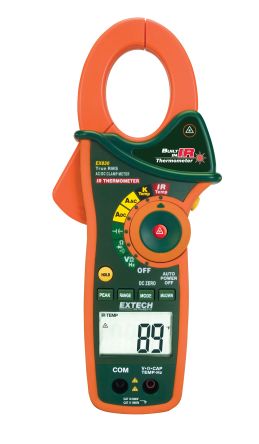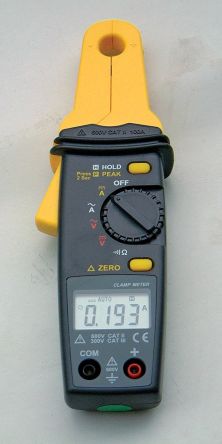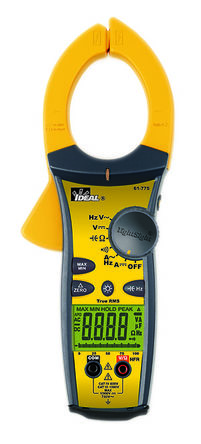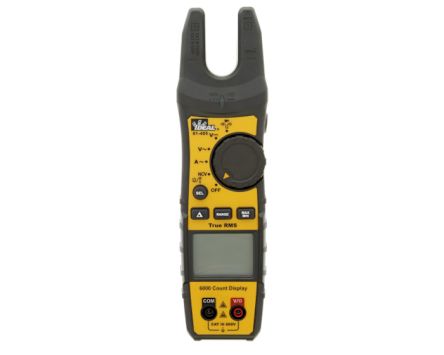- Automation & Control Gear
- Cables & Wires
- Enclosures & Server Racks
- Fuses & Circuit Breakers
- HVAC, Fans & Thermal Management
- Lighting
- Relays & Signal Conditioning
- Switches
- Batteries & Chargers
- Connectors
- Displays & Optoelectronics
- ESD Control, Cleanroom & PCB Prototyping
- Passive Components
- Power Supplies & Transformers
- Raspberry Pi, Arduino, ROCK, STEM Education & Development Tools
- Semiconductors
Clamp Meters
A clamp meter is an electrical test tool that combines a basic digital multi meter with a current sensor. Clamps measure current such as AC current, AC and DC voltage, resistance, continuity, and, with some models, DC current, capacitance, temperature, frequency, and more.
Clamp meters are designed with a hinged jaw, this allows the user to clamp the jaws around a wire, cable, or other conductors at any point in an electrical system, then measure the current without disconnecting it. They are extremely popular due to safety reasons, they are convenient to use, they identify issues when installations occur and are cost effective for ongoing tester, maintenance and service requirements.
Our range of meters have been sourced from leading brands such as: Beha-Amprobe, Chauvin Arnoux, Fluke, FLIR, Keysight Technologies, Megger, RS PRO and many more.
Why would you need a clamp meter?
Originally created as a single-purpose test tool, modern day meters offer more measurement functions, greater accuracy, and sometimes specialised measurement features, as well as the most basic functions of a digital multi meter, such as the ability to measure voltage, continuity, and resistance.
Popular Clamp Meters
- AC Current
- DC Current
- AC-DC
- Leakage
- HVAC
- Power
Who uses them?
- Industrial maintenance technicians
- Control technicians
- Electricians – in-house and contractors
- Facilities, building maintenance, and HVAC technicians
- Service organisations
Why are clamp meters so popular?
- Safety: Clamp meters allow electricians to bypass the old-school method of cutting into a wire and inserting a meter's test leads into the circuit to take an inline current measurement. The jaws of a clamp meter do not need to touch a conductor during a measurement.
- Convenience: During measurement, it is not necessary to shut off the circuit carrying current—a large boost inefficiency.
- Service: Repair existing systems on an as-needed basis.
- Installation: Troubleshooting installation problems, perform final circuit tests and supervise apprentice electricians while installing electrical equipment.
- Maintenance: Perform scheduled and preventative maintenance and system troubleshooting.
Applications
- Industrial equipment
- Industrial controls
- Electrical systems
- Commercial/industrial HVAC



